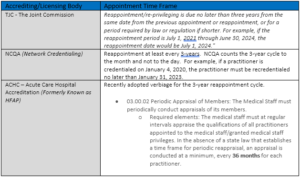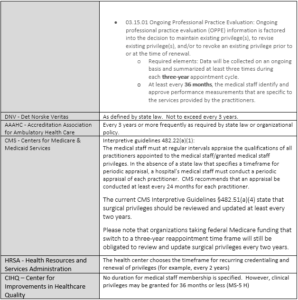History
Historically, accreditation and licensing bodies have varied in terms of the length of the reappointment. Some have followed the Joint Commission requiring a 2-year (not to exceed than 24 months until recently) reappointment cycle. Others have required or allowed a 3-year (not to exceed than 36 months) reappointment cycle. While some have deferred to the state law.
The Joint Commission (founded in 1951) is the nation’s oldest and largest standards-setting and accrediting body in health care. However, the Joint Commission is not the only standards-setting body for health care accreditation. Organizations such as the DNV, NCQA, ACHC (formerly known as HFAP), HRSA, AAAHC, and others offer accreditation to hospitals, ambulatory care centers, networks, behavioral health facilities, and federally qualified healthcare clinics.
A comparison of current accreditation and licensing standards for the reappointment cycle can be found in the chart below:


* Per Kansas (Ambulatory Surgery Centers) K.A.R. 28-34-54 (m) K.S.A. 65-431 The medical staff and the governing authority shall review the medical staff privileges at least every two years. State law supersedes all accreditation standards.
* Per Missouri CSR 30-20-021(13) Bylaws of the governing body shall provide for the selection and appointment of medical staff members based upon defined criteria and in accordance with an established procedure for processing and evaluating applications for membership. Applications for appointment and reappointment shall be in writing and shall signify agreement of the applicant to conform with the bylaws of both the governing body and medical staff and to abide by professional ethical standards. Initial appointments to the medical staff shall not exceed two (2) years. Reappointments, which may be processed and approved at the discretion of the governing body on a monthly or other cyclical pattern, shall not exceed two (2) years.
Rationale for the Change
In September 2021, the National Association of Medical Staff Services published a position statement on the reappointment cycle articulating how a change to a 3-year reappointment cycle would allow the medical staff professionals (MSPs) to re-assess practitioner performance in a more efficient and effective manner and ultimately ensure patient safety.
Formerly a 2-year cycle, the 3-year practitioner-reappointment cycle would align with health plans’ re-credentialing schedules and enable MSPs to perform ongoing professional practice evaluation (OPPE) more effectively on credentialed and privileged practitioners.
Some Things to Consider Before Transitioning to a 3-year Reappointment Cycle:
- Bylaws
- Any reference in paperwork or sections that speak to membership, privileges, committees, corrective actions, definitions.
- Credentialing policies and procedures (length and what vetting occurs at which intervals).
- Other documents:
- Governing board documents
- Employment contracts
- Affiliation and service agreements
- Other med staff documents (app forms, reference letter, rules and regs, dop’s, peer review, etc.)
- Operational Considerations
- How to transition to the new timeframe? Methodical transition ultimately takes three years to get everyone on cycle.
- Other Considerations
- The current Kansas State Law for Ambulatory Surgery Centers – K.A.R.28-34-54 (m) K.S.A. 65-431 Requires the medical staff and the governing authority to review the medical staff privileges at least every two years.
- CMS CoPs Surgical Privileges 2 years, how would you handle that with a 3-year reappointment? Processes need to be implemented to meet CMS 2-year surgical review/update requirement in conjunction with TJC/ACHC 3-year reappointment.
- The Health Care Quality Improvement Act that provides regulations for the National Practitioner Data Bank (NPDB) mandates that all hospitals query the NPDB every 2 years.
- OPPE Process needs to be established and robust in its process. Performance data must be reviewed with an extended reappointment timeframe.
- Medical Staff Dues
- Increase, drop, or assess dues more frequently?
Summary
The standards for reappointment have historically differed. Recently, the 3-year reappointment cycle is becoming more mainstream with the accreditation agencies. However, all facilities accepting Medicare reimbursement for services are required to meet the CMS Conditions of Participation. The current Conditions of Participation (CoPs) recommend reappointment every 24 months. It is important to remember state law supersedes all accreditation standards.
Facilities should also make note of CMS CoPs regarding surgical privileges. Although CMS does not have specific requirements (but rather a recommendation) for reappointment/privileging cycles, it does have specific requirements for surgical privileges. The current CMS Interpretive Guidelines §482.51(a)(4) state that surgical privileges should be reviewed and updated at least every two years.
Please note that organizations taking federal Medicare funding that switch to a three-year reappointment time frame will still be obligated to review and update surgical privileges every two years in Kansas.
The transition to a 3-year reappointment cycle will take time as facilities that have traditionally reappointed every 2-years will need to consider their medical staff bylaws and internal policies and procedures and other considerations.



